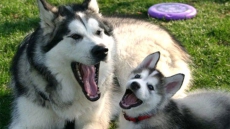TORONTO — A fur fight between animal-rights advocates and B.C. fashion retailer Kit and Ace over a line of cashmere toques has put a fresh spotlight on Canada's fur-labelling laws.
The Vancouver-based luxury retailer, which is backed by Lululemon founder Chip Wilson and run by members of his family, faced scrutiny this week over the way it labelled toques that feature fur from what the company calls an Asiatic raccoon.
However, some have argued the animal — a small canid native to Southeast Asia prized for its brown and grey fur — is a member of the dog family, rather than the raccoon family.
The kerfuffle has left animal-welfare groups and fur-industry representatives at odds, yet both sides agree that Canada needs to reform the laws that sparked the conflict.
Camille Labchuck, executive director of advocacy group Animal Justice, blamed the federal government for not mandating labels for all fur products.
Unlike the United States and the European Union, Canada does not require fur to be labelled with the type of animal or the country of origin.
The debate over the labelling of fur from the Asiatic raccoon has persisted for several years as scientists weighed in with their own perspective.
Last year, the U.S. Federal Trade Commission decided the animal's legal name is the Asiatic raccoon, meaning any items sold with its fur would have to carry that label in the United States.
Kit and Ace, which has 32 U.S. stores, said in a statement that the company complies with Canadian law and that the Asiatic raccoon — Nyctereutes procyonoides — is not the same species as the domestic dog — or Canis familiaris.
The company has used the fur in other products, including sweaters and a men's scarf.
Alan Herscovici, head of the Fur Council of Canada, said any outrage is completely fabricated because the company clearly identified the animal's legal name on the toque's tag. He said there are already laws that punish companies for mislabelling products.
Yet he said he supports mandatory labels now that fur has shifted from a being luxury good sold by specialized retailers to mainstream fashion produced in larger quantities.
Peter Fricker, communications director at the Vancouver Humane Society, said the entire debate about the correct name for the animal is a irrelevant to the bigger question of animal rights.
"Whether the fur is coming from a member of the canine family or a raccoon, we're still opposed to the use of fur in fashion," he said.





